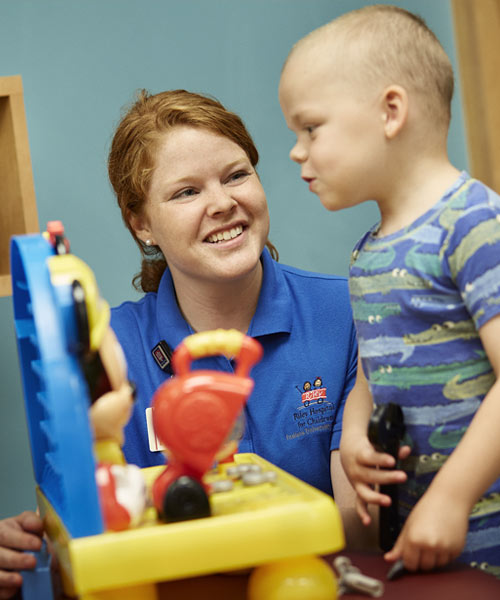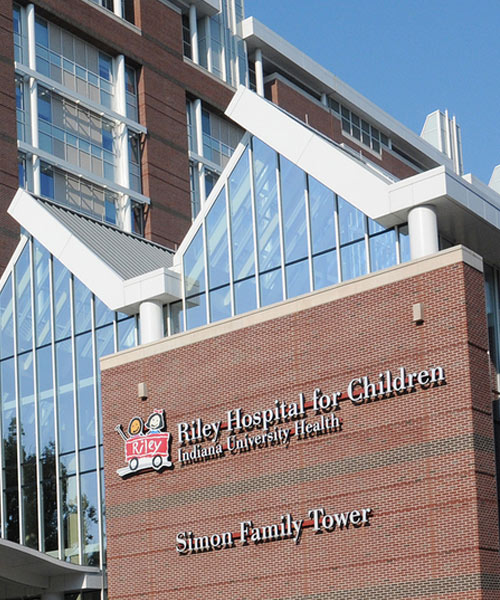Riley at IU Health Launches Bold New Program to Protect Brains of Vulnerable Infants
More than a third of all infants admitted to the neonatal intensive care unit (NICU) at Riley at IU Health are either born with, or at high risk for, serious brain complications. These include seizures, brain bleeds, the effects of oxygen deprivation and the accumulation of fluid in the brain problems that can exact a lifelong toll.
To meet this challenge, the hospital is introducing The Riley at IU Health Neuro NICU at IU Health, an aggressive new program designed to monitor, treat and support such babies throughout their first crucial days and beyond. The initiative is a unique, joint effort between the hospital’s pediatric neurology department and its level 4 NICU the highest designation. Importantly, it dedicates a full-time pediatric neurologist to the NICU, who will collaborate with neonatologists to monitor these vulnerable infants. The program is also the only one in Indiana and one of very few in the country with a “neonatal neurotelemetry unit,” which allows neurodiagnostic specialists to observe the brainwaves of infants via continuous, real-time neuromonitoring technology so that signs of trouble the onset of symptomless seizures, for example can be immediately addressed. The data can be accessed securely from remote points, such as in a neurologist’s home.
These developments will enhance the existing multidisciplinary team of Riley at IU Health experts skilled at caring for and operating on the brains and spinal cords of newborns.
“This new program assembles some of the sharpest minds to offer targeted surveillance, treatment and support for these infants during a critical window of development when every second counts,” said Dr. Jeff Sperring, president and CEO of Riley at IU Health.
The population of affected children is large. In addition to infants born with congenital brain conditions, approximately 1 in every 9 babies born in the United States is born too soon, increasing the risk of cerebral palsy and other long-term neurodevelopmental issues, according to the Centers for Disease Control and Prevention. Reducing brain complications that premature infants face will be a central area of focus for the program. “Advances in neonatal medicine have allowed us to help even the tiniest babies survive,” said Dr. Ulrike Mietzsch, Riley at IU Health neonatologist and the program’s co-director. “This program is part of the next wave of discovery toward shielding their brains from damage.”
Another area of focus will be optimizing outcomes for infants who are oxygen deprived at birth, a dangerous and potentially fatal brain disorder called hypoxic ischemic encephalopathy. These babies will continue having access to whole-body cooling therapy, which involves placing infants on special blankets to chill their body temperature to precise degrees. The treatment has been shown to limit or prevent brain damage that until relatively recently was virtually impossible to stop. The Riley at IU Health NICU team has more than 10 years’ experience administering the therapy and will continue researching ways to enhance the approach.
“These are just a few of the many conditions we will target,” said Dr. Mandy Harris, the Riley at IU Health pediatric neurologist who will also oversee the program. “Our overarching goal is to enable more babies born with serious neurological issues to grow up without impairments.”
Once infants are well enough to “graduate” from the Neuro NICU, their care won’t stop: They will be monitored through the Riley at IU Health Newborn Follow-Up Program, assuring parents that their children are hitting key developmental milestones.
###
About Riley at IU Health For more than 85 years, Riley at IU Health has been one of the nation’s leading children’s hospitals. Each year, Riley at IU Health provides compassionate care, support and comfort to 215,000 inpatients and outpatients from across Indiana, the nation and the world. Part of Indiana University Health, Riley at IU Health enjoys a unique partnership with the Indiana University School of Medicine, giving our highly skilled physicians access to innovative treatments using the latest research and technology.
Media Contact
Lindsay Lyon, llyon1@iuhealth.org 317.962.5500




